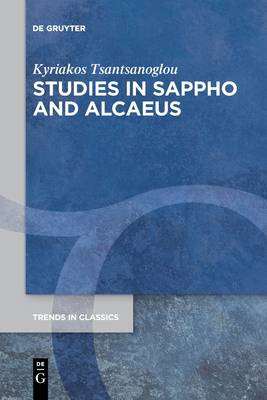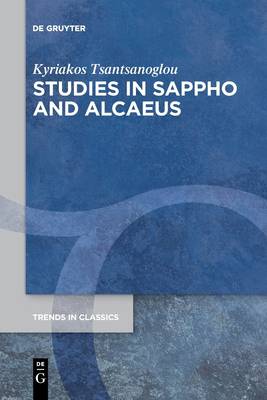
Je cadeautjes zeker op tijd in huis hebben voor de feestdagen? Kom langs in onze winkels en vind het perfecte geschenk!
- Afhalen na 1 uur in een winkel met voorraad
- Gratis thuislevering in België vanaf € 30
- Ruim aanbod met 7 miljoen producten
Je cadeautjes zeker op tijd in huis hebben voor de feestdagen? Kom langs in onze winkels en vind het perfecte geschenk!
- Afhalen na 1 uur in een winkel met voorraad
- Gratis thuislevering in België vanaf € 30
- Ruim aanbod met 7 miljoen producten
Zoeken
Omschrijving
The poetry of the archaic poets of Lesbos, Sappho and Alcaeus, has been imperfectly and poorly transmitted either in book fragments or in later ragged papyri, so that new attempts of interpretation will always be required, especially when new research tools and methods have appeared in classical scholarship.
The book consists of 14 articles by the author, which present and deal with diverse problems of the two poets of Lesbos. Various questions on already transmitted poems, different readings, reconstructions, and interpretations of the new finds are proposed, but, most importantly, new approaches in general topics, such as the division of Sappho's work in Books, the logic leading to this division, the order of these Books, the contents of each of them, the interpretation of the surviving fragments, often quite different than before. A feature that characterizes the old-age poetry of Sappho is her anxiety about the posthumous fate of her poetry and her hope that Kleïs, her only daughter, will ensure its dissemination. Finally, the author investigates the communal festival of Hera in Lesbos, a festival performed in common with Zeus and Dionysus, the so-called "Lesbian Triad". The festival is specified as a welcome to the season of spring at the time of the vernal equinox. Also, the location of the temenos of Hera is investigated, close to Pyrrha of Lesbos, which was the site of Alcaeus' second exile.
The book consists of 14 articles by the author, which present and deal with diverse problems of the two poets of Lesbos. Various questions on already transmitted poems, different readings, reconstructions, and interpretations of the new finds are proposed, but, most importantly, new approaches in general topics, such as the division of Sappho's work in Books, the logic leading to this division, the order of these Books, the contents of each of them, the interpretation of the surviving fragments, often quite different than before. A feature that characterizes the old-age poetry of Sappho is her anxiety about the posthumous fate of her poetry and her hope that Kleïs, her only daughter, will ensure its dissemination. Finally, the author investigates the communal festival of Hera in Lesbos, a festival performed in common with Zeus and Dionysus, the so-called "Lesbian Triad". The festival is specified as a welcome to the season of spring at the time of the vernal equinox. Also, the location of the temenos of Hera is investigated, close to Pyrrha of Lesbos, which was the site of Alcaeus' second exile.
Specificaties
Betrokkenen
- Auteur(s):
- Uitgeverij:
Inhoud
- Aantal bladzijden:
- 228
- Taal:
- Engels
- Reeks:
- Reeksnummer:
- nr. 79
Eigenschappen
- Productcode (EAN):
- 9783110763393
- Verschijningsdatum:
- 20/09/2021
- Uitvoering:
- Paperback
- Formaat:
- Trade paperback (VS)
- Afmetingen:
- 156 mm x 234 mm
- Gewicht:
- 326 g

Alleen bij Standaard Boekhandel
+ 58 punten op je klantenkaart van Standaard Boekhandel
Beoordelingen
We publiceren alleen reviews die voldoen aan de voorwaarden voor reviews. Bekijk onze voorwaarden voor reviews.









